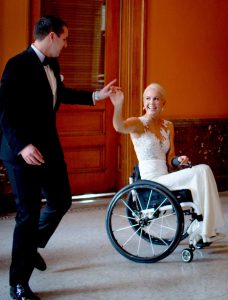Mallory Weggemann is Paralympic gold and bronze medalist, motivational speaker, disability advocate and writer. In this article for the Huffington Post, Weggemann shares the emotional hurdles she faced accepting her spinal cord injury, and her mission to challenge the perception of what living with a spinal cord injury looks like.
 It is still hard to believe that I have been LIVING with a spinal cord injury for nearly ten years now. That day is still ingrained in my memory like it was yesterday, although it often feels that my life before was a lifetime ago. Although no one signs up for this life, you never in a million years think that this could be you, but the moment it becomes a part of your life you do just that, you pick up the pieces, you move on and you continue living.
It is still hard to believe that I have been LIVING with a spinal cord injury for nearly ten years now. That day is still ingrained in my memory like it was yesterday, although it often feels that my life before was a lifetime ago. Although no one signs up for this life, you never in a million years think that this could be you, but the moment it becomes a part of your life you do just that, you pick up the pieces, you move on and you continue living.
For me it took time to come back to life, there is a period of time following my injury that I was simply going through the motions, I was treading water fighting with all my might to simply keep my head up and then it was like a switch flipped and finally I started to move forward. I realized that it was okay to move on. For a while I felt that moving on would symbolize I had given up, I felt this pressure that I had to fight to walk again. Following my injury, I felt like society looked at me as broken, as someone that needed to be fixed and that recovering from a spinal cord injury meant one thing and one thing only, walking. I fought my body day in and day out and I simply couldn’t gain traction until one day when I made the decision to stop fighting and start living. I still remember the weeks going into my decision to step away from my therapies, part of me felt guilty, I worried that this would mean I had given up, but other parts of me knew this is the only way I could truly begin fighting for myself. I had to find a way to allow myself to move on, to build a life and trust that everything happens for a reason. It took time for me to recover following my spinal cord injury but here I sit, nearly 10 years later and I have reached a full recovery. My recovery has nothing to do with my physically mobility, as I have a permanent spinal cord injury. My recovery is about the emotional healing that took place, the process of letting go and moving forward, learning to replace my feelings of hate and anger with love and forgiveness, even for some of the most unforgivable actions possible, but my journey to forgiveness wasn’t for them, it was for me. It took years, it took realizing that there were no number of medals, records or accolades that could bring me closure, I had to find a way to give that to myself.
I will never stand up and walk in the way that I did 10 years ago and that is okay, because the reality is my four wheels have taken me more places than my two legs ever did. I feel it must be said; my spinal cord injury doesn’t define me, it is a part of me, but it in no way defines who I am. I am a wife, a woman dreaming of becoming a mother, a daughter, sister and friend. I am a proud Paralympic athlete, speaker, writer, advocate and entrepreneur. I also happen to be living with a spinal cord injury. I live a fulfilling life, one that contributes to our society, to my community and one that isn’t defined by the four wheels that get me about on a daily basis. My wheelchair doesn’t mean I gave up, it doesn’t mean that I didn’t try hard enough, or that I am lazy, it doesn’t imply a lack of faith, it is simply my circumstance and it serves as my vehicle to carry out my dreams and live a fulfilling life.
This is just a small glimpse into my journey, however there are millions of individuals living in our communities with spinal cord injuries. We are your mothers, fathers, daughters, sons, sisters, brothers, neighbors, friends, colleagues and fellow human beings. So, in honor of Spinal Cord Injury Awareness month we must come together to challenge perception of what living with a spinal cord injury looks like. We must use our voices to continue the fight for inclusion, stop discrimination dead in its tracks and educate. We must continue the fight for equality, equal access to employment opportunities and representation in the media. We must fight for the next generation, because the reality is we are a part of a larger community, we are a part of the disability community and disability rights are human rights.

Mallory,
Your description of the ‘process’ of acceptance and moving forward in your life in earnest perfectly captures the essence of that process. Individuals and their families whether very new to spinal cord injury or still struggling after many months or years.
Loved your perspective of having gone to heights you never could have envisioned proir to your injury. That was, and still is, my personal experience as well. (para of 18 years)
Appreciatively,
Bill Fertig
Director, Spinal Cord Injury Resource Center
United Spinal Association